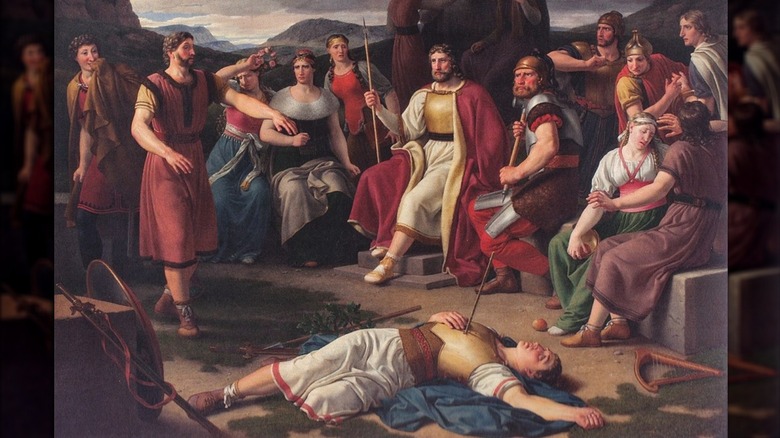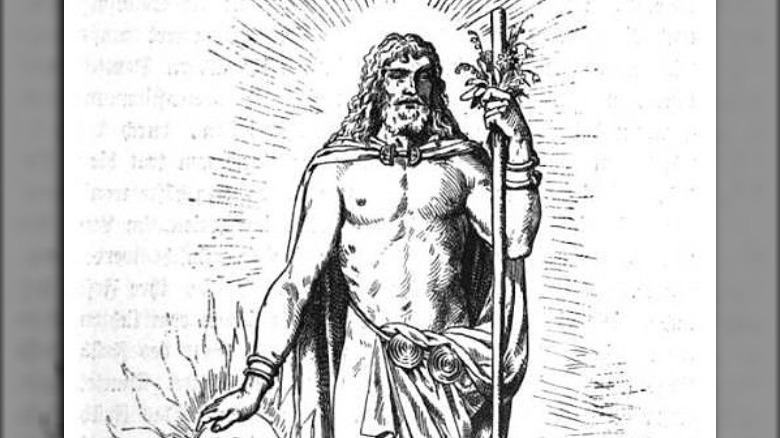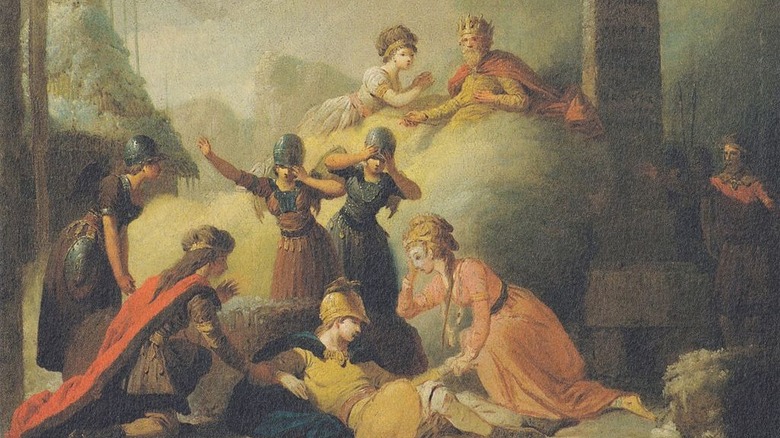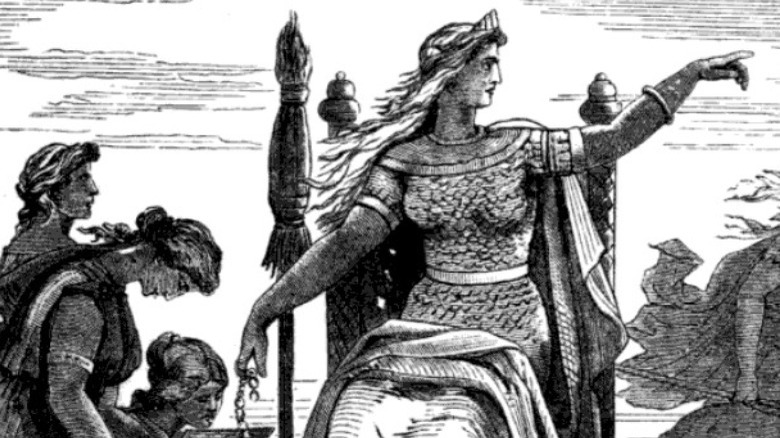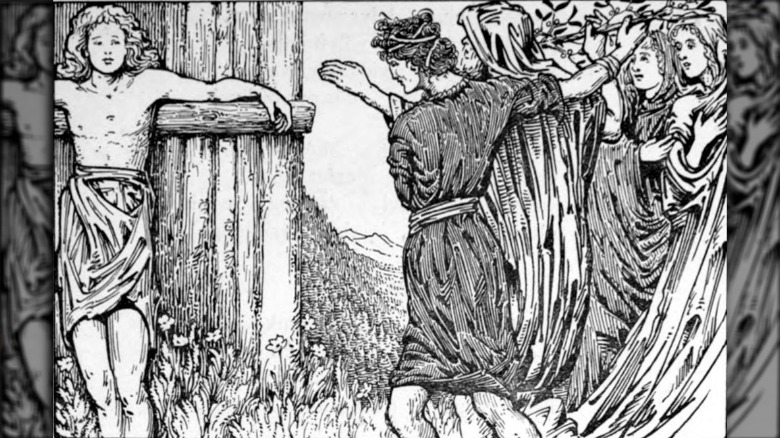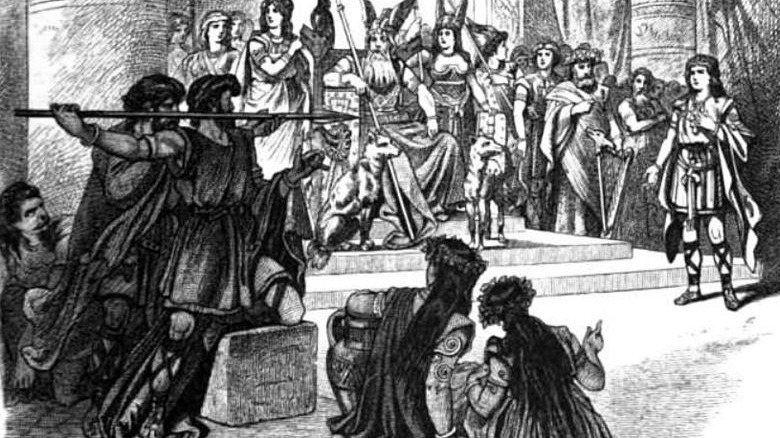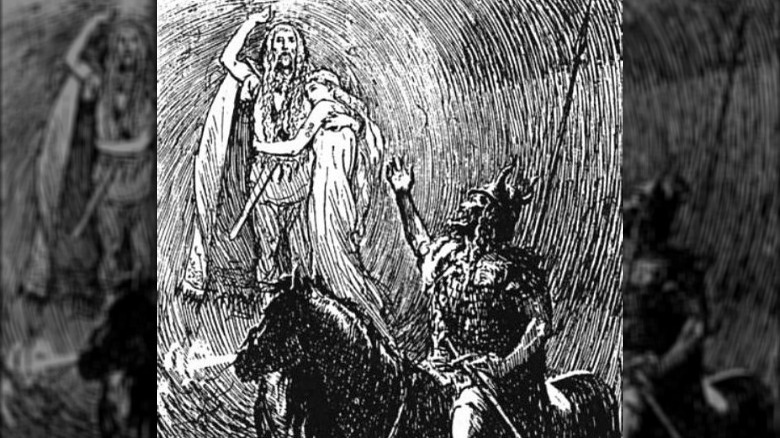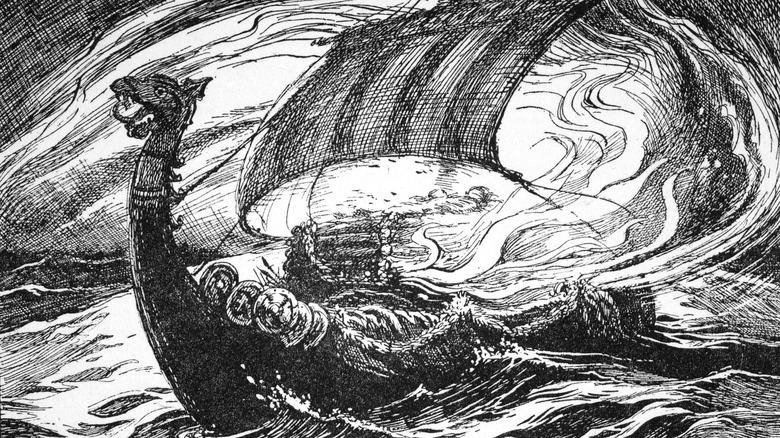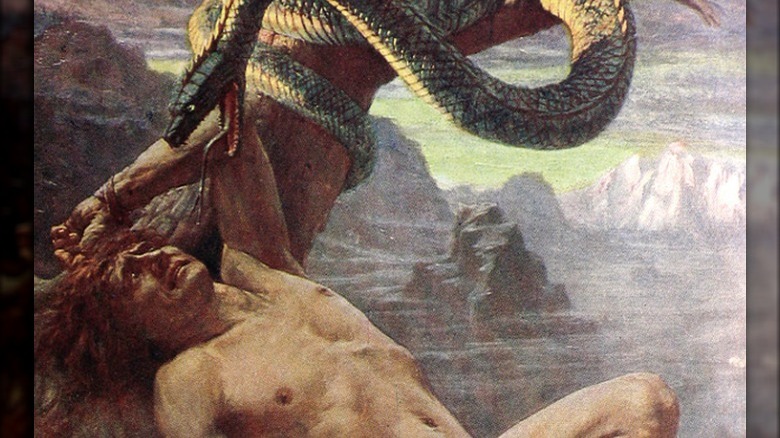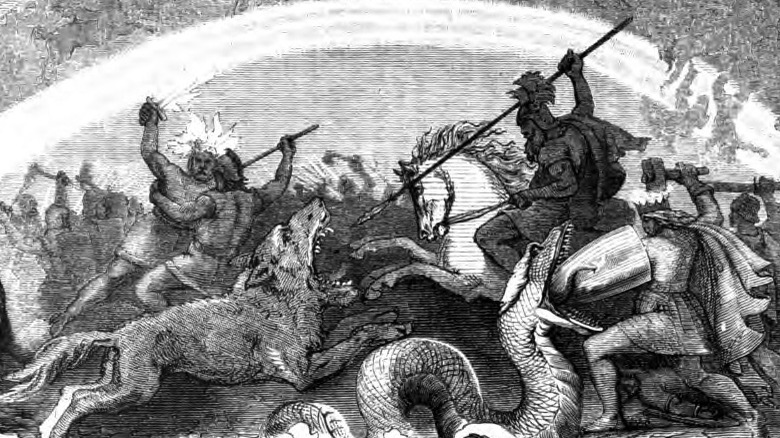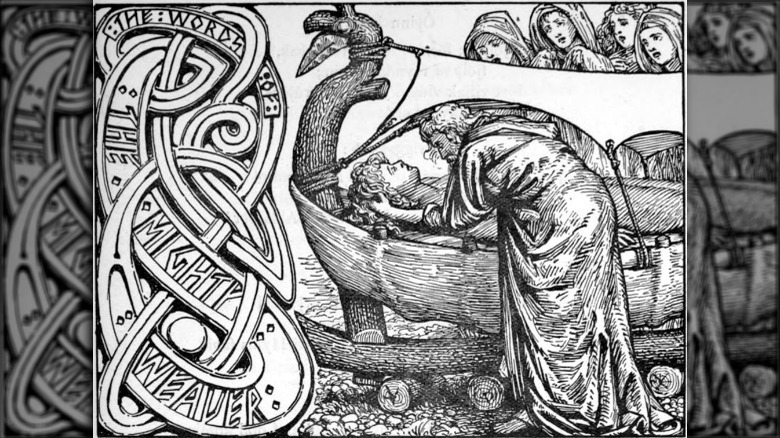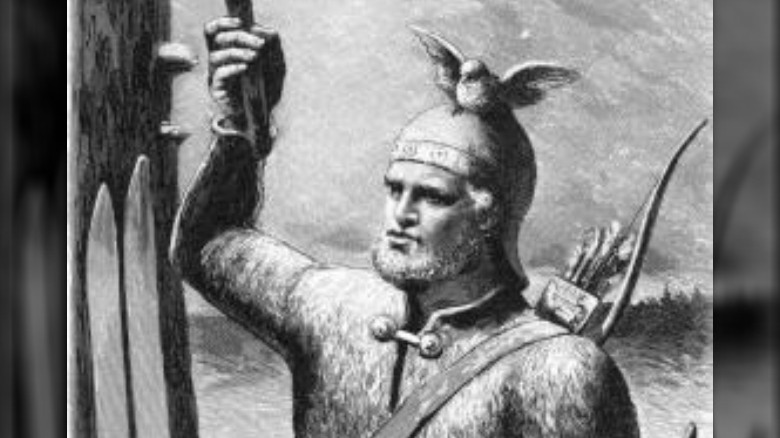The Mythology Of Balder Explained
If you think about Norse mythology, then the names that come to mind are probably ones like Thor, Loki, and Odin. That seems like a pretty safe guess, and we might have Marvel movies to thank for that. After all — be honest — did the faces of Chris Hemsworth, Tom Hiddleston, and Anthony Hopkins come to mind? Not that there's anything wrong with that by any means, but Marvel has definitely done its work in swaying just what parts of Norse mythology the general public is familiar with.
There's a lot more to Norse mythology than what's most popularly known, though. Really, there's a whole lot of interesting stuff that's worth looking into if you have the time. So, let's talk about one of those other mythological figures: Balder.
The son of Odin isn't associated with a whole lot of myths, but there are a couple things about him that are especially important. One of those happens to be his looks and demeanor, while the other is his death. And that death is a pretty involved bit of mythology, so let's get into all of the details surrounding Balder.
Who was Balder, exactly?
To put things really, really simply, Balder was effectively the representation of all things good in the world. That's basically the gist of what you need to know to understand Balder's place within the Norse pantheon, but all the details are a bit more fun.
Balder was one of the sons of Odin and Frigga (and likely one of very few actually born to both of them — if you're familiar with Greek mythology, Odin was kind of like Zeus in that he had plenty of affairs with other women, per Mythology Source). Balder was twins with the god Hodr, who happened to be his perfect opposite, as the representation of darkness and sin (via "Myths of the Norsemen from the Eddas and Sagas"). In contrast, Balder was, for all extents and purposes, perfect. He symbolized light and warmth, even seeming to physically glow at times, and was loved by literally every single one of the other Norse gods (via World History Edu). He was known for his immense wisdom and limitless kindness, trusted by all for his fair and just decisions; they could all pretty much look to him as an authority on right and wrong.
His name is even really fitting for this image, usually getting translated to "brave," "courageous," or "hero." And just to top it all off, his home — called Breidablik — was just as perfect as he was. The halls gleamed, and anything considered unclean wasn't allowed anywhere near it.
Balder's death was foretold
Things weren't fated to go perfectly for the most perfect of the Norse gods. Not even close, and a number of the gods knew this would be the case, Balder himself included.
"Myths of the Norsemen from the Eddas and Sagas" explains that Balder started to have some pretty bad nightmares — nothing necessarily concrete, just a vague sense of foreboding, but they were enough to convince him that his life was in danger (given he also had the power of prophecy, his fears were pretty valid). He wasn't the only one; his mother Frigga had also foreseen the same future, though she generally never disclosed her own visions, per World History Edu. Once that news got around, the rest of the gods all gathered together, looking for confirmation (and just more information in general), according to Encyclopedia Mythica. They began looking to other seers, called the jötnar, who confirmed that, yes, Balder did, in fact, have to die.
Odin took it one step even further, though, riding down to Niflheim (the Norse underworld) in order to forcibly revive and question a dead Vala (or Volva, depending on the translation, but a prophetess, regardless). There, he found the realm decked out for a grand feast — one he learned was intended for Balder's arrival, according to the Vala. Pressing her further, he learned that the killer would be none other than Balder's brother Hodr, and that he himself would later father Balder's avenger.
Frigga tried to prevent Balder's death
None (or, almost none) of the gods were too happy to learn that the most-loved of all of their brethren had been effectively sentenced to death, Frigga least of all. She wasn't about to allow her beloved son to be murdered without a fight. And so she hatched a plan. She sent her servants (or went herself, because translations of these ancient stories vary) to secure an oath from every single thing in the entire world not to harm Balder. Every stone and metal, every tree and plant, every living and inanimate object that existed. Quite literally everything.
Or, not quite everything. There was one thing that Frigga missed: an unassuming little mistletoe just outside the gates of Asgard. Depending on the telling, the reason for the oversight changes. It might have been overlooked, deemed too weak and unimportant to matter. It might have outright refused to agree to that oath (because it might've been Loki in disguise, per Mythology Source. Or Frigga might have considered it too young to make such a big decision, as mentioned by World History Edu. Regardless of the reason, though, the fact remained that the mistletoe didn't agree not to hurt Balder.
Not that anyone was too concerned. Frigg wasn't all that fussed about the oversight, and when Odin learned about his wife's plan after returning from Niflheim, his own fears were just about entirely assuaged (via "Myths of the Norsemen from the Eddas and Sagas").
The other gods made a game out of Balder's apparent immortality
Upon learning that nothing could hurt Balder, thus making him effectively immortal, the rest of the gods were really excited. Probably, at least in part, because it meant that they wouldn't have to lose the most well-loved of all of them, but also because it gave them a fun new game to play.
Yeah, it sounds really weird — and like a strange priority to have, all things considered — but there's truth to it.
Traditionally, the gods would all meet up in a place called the Plain of Ida, according to "Myths of the Norsemen from the Eddas and Sagas," where they would play a game that involved throwing around golden disks. They'd started to get tired of this particular game, though, so when they learned that Balder couldn't be killed, they were presented with a new opportunity. They made a game out of throwing a bunch of different things at Balder: stones, twigs, a whole bunch of different weapons, you name it. But no matter what they did, everything they threw would either fall short or glance off to the side. Balder couldn't be hurt, and it was wonderfully amusing to everyone around.
Hodr (and Loki) killed Balder
Alright, to be completely honest, not everyone actually loved Balder. Almost everyone did, and that one little detail makes all the difference. Because that one person who didn't especially like Balder was everyone's favorite trickster god, Loki.
Loki happened upon the whole situation where everyone was throwing stuff at Balder and wanted to know what was going on (via "Myths of the Norsemen from the Eddas and Sagas"). So, naturally, he turned into an old woman and approached Frigga, who was weaving and watching the fun. Frigg gladly explained that Balder was essentially invulnerable, but also admitted that he was still weak to that mistletoe growing outside of Asgard.
Now that was something Loki could work with. He went and found that mistletoe, fashioning it into a weapon — potentially an arrow (via Mythology Source) or a makeshift spear of sorts. As for who would wield it, Loki returned to the group and found Hodr sitting out the game. He was blind, after all, and couldn't really aim at Balder, whom he couldn't see. So Loki offered to help, giving Hodr the weaponized mistletoe — which Hodr probably didn't know was mistletoe — and aiming his hand. He threw the weapon, and it flew true, leaving Balder suddenly dead at everyone's feet. Hodr had unknowingly killed his brother, and the prophecy had come to pass.
Balder couldn't be saved (which was probably also Loki's fault)
With the prophecy coming true and Balder left dead, everyone mourned, but not everyone gave up hope. According to "Myths of the Norsemen from the Eddas and Sagas," Odin and Frigga offered their love to any god who would ride down to Niflheim and see if Hel would agree to release Balder's soul. Hermod took them up on that offer and headed down to Niflheim to bargain with Hel herself. She agreed to release Balder, but on one condition. She needed proof that everyone was truly hurt by his death; every single thing on Earth would have to weep for him.
And that sounded like great news! Everyone loved Balder, after all! It would be so easy to get everything to shed a tear for him; how could they not feel sad after hearing the news? So, at the start, everything was looking pretty good. All that heard about Balder's death did in fact shed a tear.
But the process didn't stay quite so smooth. One person refused to cry for Balder's death: the giantess Thokk from Jotunheim (via Mythology Source). She was found at the side of the road and, rather than cry, mocked everyone else for their loss, saying that she didn't mind Hel holding onto his soul forever. Really, this might not be all that surprising, considering that it's largely believed Thokk was also Loki in disguise, ensuring that Balder's death stayed permanent.
Balder's funeral was extravagant and tragic
Given that Balder was so well-loved by everyone, it's not really a surprise that his funeral was quite the event.
Balder's body was loaded onto his ship, called the Hringhorni (or Ringhorn, to simplify it), which was fashioned into a floating funeral pyre of sorts (via World History Edu). According to "Myths of the Norsemen from the Eddas and Sagas," the ship was packed to the brim with his belongings (including his horse, apparently) and all kinds of riches: tapestries, flowers, weapons, and the like. Among all of that was also Odin's ring, Draupnir, which he laid with his son while whispering something into his ear — potentially the word "resurrection," but no one knows for sure. The rest of the gods filed by to say their goodbyes, though none were as heartbroken as Balder's wife Nanna, who died on the spot, choosing to be with her husband even in death.
Once all of that was done, all that was left was to push the ship out to sea, except that doing so was just a little impossible. So many riches had been loaded onto the boat that none of the gods could actually get it out into the water; they had to enlist the help of another giant — Hyrrokin — in order to actually get the ship out there. Then, it was Thor's job to light the ship aflame (at which point he pushed the dwarf Litr into the fire, too).
Vali was born to avenge the death of Balder
Alright, so this part of the story doesn't directly involve Balder, but it's definitely connected to him. After all, isn't it worth knowing whether or not Loki was punished for his actions?
When Odin first heard the prophecy predicting Balder's death, the second half of that prophecy spoke of a boy "Who ne'er shall comb his raven hair, Nor wash his visage in the stream" (via "Myths of the Norsemen from the Eddas and Sagas") until Balder was avenged and Hodr was dead. (Arguably, the whole incident wasn't Hodr's fault, but it's how Norse mythology treated vengeance). That boy mentioned in the prophecy was Vali, the son of Odin and Rinda, who grew to adulthood in the space of a day, according to Mythology Source. By the same night, he'd killed Hodr.
As for Loki, the trickster god had confessed to the crime, per World History Edu, and the rest of the gods searched for him. Despite Loki's best efforts, the gods found and captured him, just in time for Vali to arrive, hauling Nari — one of Loki's sons — along with him. Or, just in time for Loki to watch as Vali ripped his son to pieces, turning the entrails into chains that were used to bind him. A serpent was left above him to drip burning venom onto his face until the end of the world (Ragnarök, which really wasn't too far off by that point).
The end of the world gave Balder a new start
Ragnarök was really, really messy. Frankly, it's far too complicated a story to really be explained in full here, but it's a pretty important event in Norse mythology. In general, Timeless Myths calls Balder's death a dark portent for everything that would come shortly after with Ragnarök. Loki broke free of his chains and led the frost giants while the gates of Niflheim burst open, Hel leading her own army. The Aesir gods (Odin, Thor, and other Norse gods you're familiar with) rallied their own forces, including the dead heroes residing in Valhalla. War erupted, many of the familiar names of Norse mythology fell in the battles, fires scorched all Nine Realms, and the skies turned dark. It all looked pretty bleak.
But how about returning to some prophecies again? Because things weren't always fated to stay so dark. Rather, in the wake of Ragnarök, Balder was meant to rise again and become the leader of the new world, alongside Hodr (via World History Edu).
And that's exactly what happened. According to Mythology Source, when Hel raised her army, the gates to her realm were broken over. Great monsters were allowed to escape, but once the dust had settled, Balder and Hodr — who had reconciled during their time together in death — were able to walk right out. With a handful of other survivors, they set about rebuilding Asgard, and Balder took his place as one of their leaders.
The myth of Balder explains a lot
The whole long story of Balder's death doesn't exist just as some random story. Like with Greek mythology, the story was put together to explain some part of the natural world; in this case, Balder's death has to do with the cycles of day and night, as well as the seasons.
"Myths of the Norsemen from the Eddas and Sagas" explains that a lot of that comes from the dichotomy between Balder (warmth and light) and Hodr (cold and darkness). When Balder was alive, the light would dominate, representing summer and the day. His death at Hodr's hand represented the switch to winter and the night. But Hodr's death by Vali — who was avenging Balder — then symbolized the switch back into the light.
And this whole narrative is actually supported even further. Balder's death is said to have occurred on Midsummer's Eve; after his death, the days start getting shorter. And while he was down in Niflheim, he actually sent a couple of gifts back to his family with Hermod: Odin's ring Draupnir and a flowery tapestry. On the surface, that doesn't seem all too significant, but Draupnir was said to represent fertility. When you take that together with the tapestry — a pretty clear symbol of growing vegetation — then those gifts are meant to represent the coming of spring.
Uller and Balder were good friends
Despite what you generally find while looking into the mythology of Balder, not all of the stories are actually about his death! One of those myths is his friendship with the god Uller, as mentioned by "Myths of the Norsemen from the Eddas and Sagas."
Uller — or Ullr, according to Encyclopedia Mythica — was a god associated with the winter and with sports such as archery and skiing. Being associated with winter, he was forced into the underworld for part of the year — specifically during the summer, at which point Odin would take over the seasonal weather. A lot like the Hades and Persephone myth, actually, which is probably a bit more popularly known.
But Uller wasn't the only one undergoing this seasonal exile. Balder was as well, and he would join his fellow god in the underworld at midsummer. The two of them were also considered somewhat similar to each other, what with Balder being the literal personification of light and Uller being considered responsible for the aurora borealis (the northern lights). Ultimately, the two supposedly became close, bonding over their similar situations, though there isn't much known on this front (and not much is really known about Uller in general, per Mythology Source).
